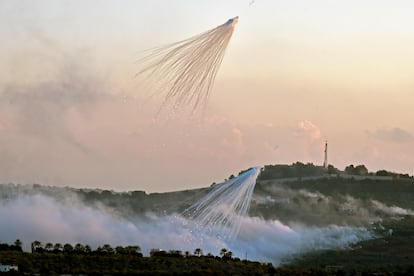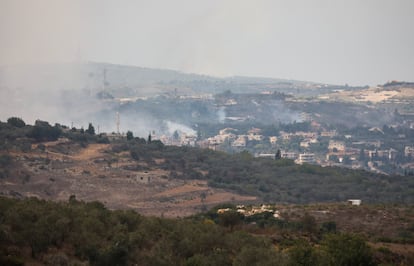Amnesty International accuses Israel of using white phosphorus against civilians on the Lebanon border
The organization has documented at least nine cases of people injured by projectiles containing this substance, which is prohibited by international law when used on non-military targets

The Israeli army used artillery shells containing white phosphorus against civilians in Lebanon, Amnesty International said on Tuesday. The organization said the October 16 attack on the Lebanese village of Dhayra should be investigated as a war crime as it was an “an indiscriminate attack that injured at least nine civilians” who inhaled or had contact with this chemical. The report from Amnesty International comes after Human Rights Watch (HRW) verified that Israel also used projectiles with white phosphorus on Gaza City.
The use of incendiary weapons is restricted under international humanitarian law, since substances such as white phosphorus are highly flammable because they react quickly with oxygen. In addition, the toxic smoke generated by fire spreads more easily. On battlefields, it is used to create smoke screens, but when it is released over a population, contact can cause severe burns that reach the bone, respiratory diseases and blindness. White phosphorus is known for its bad odor and creating dense clouds of white smoke.
The accusations from Amnesty International are based on witness accounts of the attack on Dhayra, who attest to the use of artillery containing this chemical. The organization cites the mayor of Dhayra, Abdullah al Ghrayyeb, who said on the afternoon of October 16 “a very bad odor and massive cloud covered the town so that we were not able to see beyond five or six meters in front of us.”
That same day, the Lebanese Italian Hospital, located in the municipality of Borj El Chmali — 12.4 miles further north — treated nine patients from Dhayra and nearby villages who were suffering from “shortness of breath and coughing,” according to an emergency doctor. The Regional Director of the Lebanese Civil Defense, Ali Safieddine, who facilitated the transfer of injured civilians to the hospital, said he received calls from residents who reported “bombs that are producing extremely bad odor and causing suffocation once inhaled.”

Donatella Rovera, a crisis and conflict researcher at Amnesty International, said another piece of evidence is a video that shows one of these projectiles exploding in the air and releasing bomblets over the border area, in the style of a cluster bomb. “We were able to verify that this artillery was launched from Israel and that it has the characteristics of a rocket with white phosphorus,” she told EL PAÍS in a telephone conversation.
Two weeks ago, Human Rights Watch accused the Israeli army of dropping munitions containing white phosphorus on Gaza City, one of the most densely populated places in Gaza, on October 10 and 11. The organization verified two videos that showed “multiple bursts” of white phosphorus fired over the al-Mina area, near the port. In addition, it collected testimony from two people who said the air attacks — launched as part of Israel’s offensive against Hamas in Gaza — were followed by “white lines going earthward.”
Previous episodes
Israel “categorically” denied using incendiary weapons in the war against Hamas, Israel Defense Force (IDF) spokesman Lt. Col. Peter Lerner told CNN. But Israel does have history with this type of artillery. During the 23-day conflict against Hamas between 2008 and 2009, an HRW report determined that the Israeli army attacked civilians with white phosphorus. Investigators found 24 spent white phosphorus 155 mm shells, made in the United States, in homes and on residential streets. Another 48 shells were found by Palestinians. “The shells and the canisters they contained were colored a distinctive light green, which identifies them as having held white phosphorus,” the report stated.
The Israeli army admitted to having fired white phosphorus, but defended having done so legally to form smoke screens to protect its soldiers from Hamas militants. Israel has not signed the 1980 Geneva Protocol, which regulates the use of incendiary weapons and explicitly prohibits their use against civilians or military objectives located within a concentrated civilian population.
Sign up for our weekly newsletter to get more English-language news coverage from EL PAÍS USA Edition
Tu suscripción se está usando en otro dispositivo
¿Quieres añadir otro usuario a tu suscripción?
Si continúas leyendo en este dispositivo, no se podrá leer en el otro.
FlechaTu suscripción se está usando en otro dispositivo y solo puedes acceder a EL PAÍS desde un dispositivo a la vez.
Si quieres compartir tu cuenta, cambia tu suscripción a la modalidad Premium, así podrás añadir otro usuario. Cada uno accederá con su propia cuenta de email, lo que os permitirá personalizar vuestra experiencia en EL PAÍS.
¿Tienes una suscripción de empresa? Accede aquí para contratar más cuentas.
En el caso de no saber quién está usando tu cuenta, te recomendamos cambiar tu contraseña aquí.
Si decides continuar compartiendo tu cuenta, este mensaje se mostrará en tu dispositivo y en el de la otra persona que está usando tu cuenta de forma indefinida, afectando a tu experiencia de lectura. Puedes consultar aquí los términos y condiciones de la suscripción digital.









































